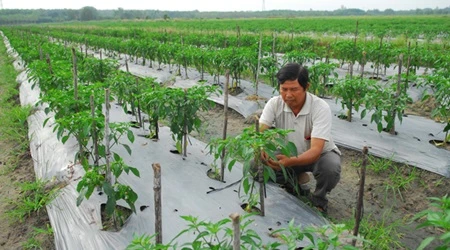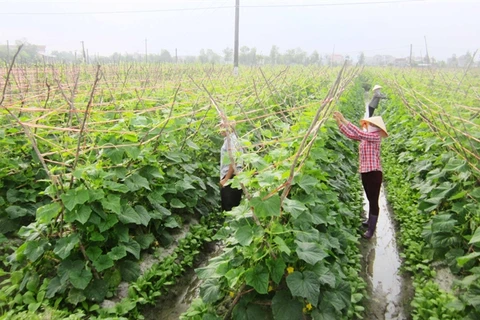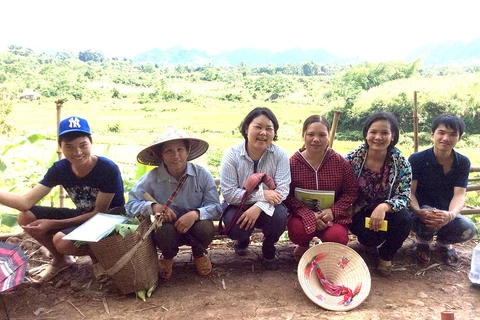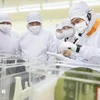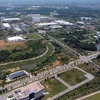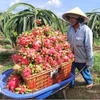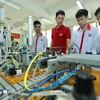Dak Lak (VNS/VNA) - Wanting to bring consumers clean and chemical-free vegetable products, an ambitious young crop scientist has acquired state-of-the-art technology from Israel to create an organic garden in the arid land of the Central Highlands.
Dinh Huy Hoang majored in crop science at the agro-forestry faculty of the Tay Nguyen (Central Highlands) University in Dak Lak province. During his sophomore year, he heard about an agriculture course opening in Israel, applied and got in.
The best part about the course was the combination of theoretical learning and practical field experience, Hoang said excitedly. “A trip to Israel, a country with advanced agriculture, was a dream of mine for a long time. So when the chance came up, I decided to temporarily halt my study in Vietnam to go learn something new,” he said.
Hoang’s decision provided him with a rewarding experience, which he described as "awesome" and "beyond imagination".
“Vegetables are grown on vast tracts of land, stretching over thousands of hectares, but are all under the roof of greenhouses and domes,” Hoang said. This is in stark contrast to the small-scale agriculture in Vietnam, where a field under 2 hectares is considered large enough.
But the most "mystifying" part for Hoang and other Vietnamese students taking part in the course was that despite the extreme weather conditions in Israel, where temperatures in some parts go as high as 50 degrees in summer, “the vegetables and plants all look fresh and have a healthy green color.”
Nearly every step of cultivation is done in the greenhouses, outfitted with misting systems and air conditioners that help to maintain optimal conditions for vegetables to develop throughout the year, independent of the weather.
Hoang said that to counter the adverse land condition, which is stony, dry, and steep in some parts of southern Israel, the Israelis had to level big plots of land, then pour sand (20-30cm thick) on top. In addition, given the low rainfall, the Israelis had to drill wells reaching 500-2,000 metres into underground water aquifers, or to filter saltwater to use for human consumption and agriculture.
“Contrary to the wasteful practice of surface irrigation used in Vietnam, in Israel the preferred method is drip irrigation, deployed via a crisscross network of pipes buried in the soil,” Hoang said. “Nutrients and fertiliser dissolved in the water will be delivered to every plant root in the right amount, saving a lot of resources.”
In Vietnam, the use of biological control agents to suppress plant disease is not new and is over the use of chemical pesticides. However, the Israelis take it to a whole new level, Hoang said, adding that he learned ways to utilise "natural enemies" of insects like ladybug larvae or worm-catching bees.
Just a year in the Middle Eastern country has been inspiring to Hoang. Compared to Israel, the conditions in the Central Highlands are more favourable – cooler weather, fertile soil, and abundant water. Combined with Israeli technology, the results would be outstanding, he said.
After completing the programme in October 2015, Hoang rented a one-hectare plot in Buon Ma Thuot city to start achieving his dream.
In order to grow organic vegetables, he spent an entire year improving soil conditions, including repeated soil sampling in lab tests to make sure it had reached required levels.
He recruited other graduates from his university to join forces in building the infrastructure of his dream garden, like hothouses, workshops, furniture, in addition to various soil cultivation measures.
Since Hoang is striving for 100 per cent organic vegetable cultivation, meaning no chemical plant protection products, vegetables are intercropped with strong-smelling herbs like lemongrass, cilantro, or basil, to drive pests away. In addition, for better protection, he uses a mixture of garlic, ginger, chili, mixed in white wine to spray onto plants. According to Hoang, this liquid substance has an acrid smell that is a major turn-off for insects and can be easily washed off, posing virtually no threat to consumers’ health.
During certain days of the week, students from the Central Highlands come to the garden to help with the harvesting. This provides them with practical experience and a little additional income to cover living expenses.
Aside from vegetable cultivation, Hoang also raises rabbits, an initiative he plans to expand so that his farm also produces meat, eggs and milk, besides vegetables.
Right now, co-operation with a number of supermarkets across the city has ensured a stable consumption of his produce. “In this early period, the profits are used to expand or develop the garden or to pay the students. We only started making a profit last August, about 90 million VND (4,000 USD),” Hoang said.
Professor Phan Van Tan, former head of the university’s agro-forestry faculty, said organic farming takes a lot of effort and financial resources, which result in higher prices and make it difficult to sell.
However, “a fresh graduate who commits to organic vegetables is a rare and daring thing,” Tan said. “Not many young people are drawn into this path or are able to think up this plan. Plus, with the growing demand for clean agricultural products, I think his produce will surely catch on,” he added.-VNA
VNA

